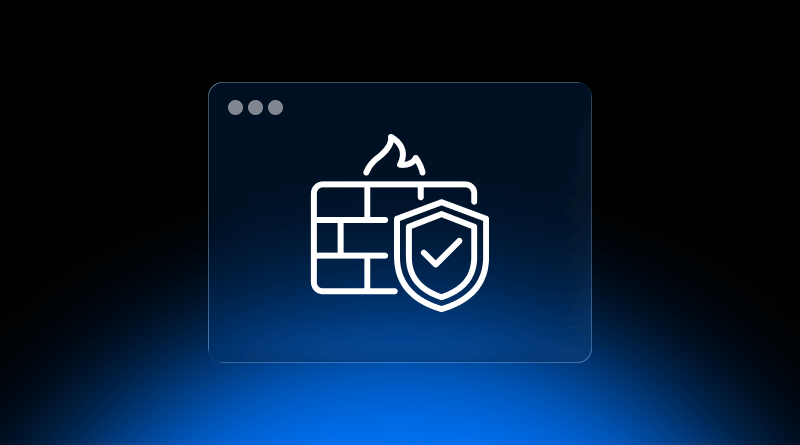If you’re the owner of a website built on WordPress or another content management system, you certainly know the utility of plugins. On the positive side, they empower your website with exceptional functionalities, but they also make it vulnerable to modern cyberattacks. Most website owners spend the majority of their time posting high-quality content and designing beautiful interfaces, but overlook plugin security mistakes. Even a single flaw in managing plugins can introduce potential threats to a platform.
Server-level firewalls are one of the effective security measures to safeguard your plugins from security vulnerabilities. Before exploring the details of best practices for plugins, it’s essential to know the true potential of server-level firewalls and how they implement protection measures for your website plugins.
Table Of Content
What is a Server-Level Firewall?
A server-level firewall is a strong security framework integrated on the server side for continuous tracking and filtering of traffic coming and going from a server. While software firewalls ensure the protection of individual devices or software, your server-level firewall operates at a network layer to provide more comprehensive measures.
Such firewalls are responsible for dedicated server security and are designed to protect against the deadliest cyberattacks. With timely filtration of malicious data, the incidents of data breaches are eliminated that saves your website from unauthorized activities. The administrator of a server has the authority to set specific policies for controlling network traffic and to provide a way for legitimate traffic.
Impact of Neglecting Plugin Security
Undoubtedly, plugins are the crucial elements for enhancing the website’s functionalities. However, if not managed correctly, the same plugins can become a reason for security disasters.
1. Outdated Plugin Struggles
Website owners who install plugins for WordPress or other platform-based websites, but overlook timely updates and adjustments, face incompatibility issues. It has been observed that outdated plugins are security vulnerabilities, providing an opportunity for cyberattackers to enter your system.
2. Using Untrusted Plugins
For the sake of cost-cutting or simply negligence in researching the right plugins, many website owners install unreliable plugins designed by unauthorized entities. It can create several security loopholes and result in sluggish website performance.
3. Plugin Misconfiguration
There are plugins requiring timely settings to benefit from their security measures and functionalities. However, failing to do so during their installations creates a mess. Instead of supporting your website’s responsiveness, such plugins become a reason for the website’s poor performance.
4. Plugin Excess
Many think that installing too many plugins can make their website unique and attractive to visitors. They don’t realize that unnecessary plugin integrations cause degradation in website performance and an unreliable user experience.
Safeguarding Plugins with Server Firewalls
Protecting a website from malicious traffic is one of the key challenges for website owners. Hackers often search for plugin vulnerabilities to gain unauthorized access to a website.
1. Filtering Malicious Traffic
As we know, server-level firewalls are mounted on the server side, tracking the incoming and outgoing traffic flow. If cyber attackers target a plugin vulnerability to access your website, this firewall does a timely intervention. It filters traffic based on different security parameters and blocks the packets that appear suspicious.
2. Shielding Against Brute-Force Attacks
Brute force is one of the most prevalent attacks, where attackers attempt to break login security to gain administrative authority. Under this method, they try different combinations of login details. By integrating the server-level firewall, it’s possible to limit the failed login attempts. If such incidents happen, this firewall blocks the activity to prevent the damage.
3. Blocking DDoS Risks
Under Distributed Denial of Service (DDoS) attacks, your website server experiences malicious traffic. Attackers search for plugin-related vulnerabilities on your website to gain unauthorized access. Your hosting provider protects your website with a firewall at the server. It helps identify abnormal traffic patterns and blocks suspicious patterns.
4. Guarding Sensitive Data
When you have an e-commerce platform or event management website, plugins installed include sensitive information about customers. Attackers identify security flaws in such plugins and access the platform’s admin area. A website security firewall blocks suspicious requests to protect confidential data.
5. Stopping Harmful Plugins
If you partner with a renowned hosting provider, they facilitate your website with advanced firewalls, protecting plugins from attacks. These firewalls can find outdated or malicious plugins on your website. Additionally, it blocks these plugin functionalities to avoid any harm.
Web Application Firewall (WAF) Shield for Plugins
Server-level firewalls block bad traffic coming to the server at the network layer. A web application firewall (WAF) operates at the application layer, which is most responsible for the seamless operations of your website. This layer of framework ensures accurate sync of your website, all installed plugins, and data. A WAF integration ensures continuous monitoring and timely filtering of the requests received by your website. By implementing server security best practices, it blocks malicious requests and permits authentic ones.
The integration of a WAF ensures prevention from malicious scripts that attackers inject into your plugin forms. The safeguard against cross-site scripting is essential for a seamless website function.
Under remote file inclusion, attackers attach external files to plugin code that is installed on your website. These attachments attempt to run harmful activities on your platform. A WAF security protocol blocks scripts before they get merged into your plugin code.
Cross-site request forgery is one of the advanced forms of threats in which attackers attempt to trick your users. They’re forced to perform activities through plugins, which may result in a website crash or other harmful consequences.
With the accurate configuration and implementation of server-level firewall and WAF, you can safeguard your website plugins from all forms of security vulnerabilities. These are essential to protect your server and web applications.
How to Ensure WordPress Plugin Security?
Running behind free plugins can cause disastrous situations for your website. You should install plugins from authorized sources such as popular platforms or established developers. Never use plugins offered by third-party platforms, which often compromise security measures and may be harmful to your website.
Many website owners believe that installing a plugin for a website is the ultimate deal. They forget to update them at regular intervals to integrate newer functionalities and implement security measures. Maintain a habit of tracking every single plugin for the latest updates, which usually bring advanced fixes for security vulnerabilities.
Having more plugins installed for your website doesn’t mean it will deliver exceptional performance. Overuse of plugins results in sluggish website performance and also makes it difficult to manage them. Install the plugins necessary for the current version of your website. If any existing plugin becomes irrelevant for the website, ensure you remove it immediately.
While installing and even after their integrations, check for their permission request. Carefully review what access they demand and whether this access is necessary. Grant permission to plugin requests that matter for their effective functioning on your website. If there are any suspicious requests, block them at that stage only.
Server Security Best Practices for Plugin Safety
1. Security Protocol Integration
When your users spend time on your website, they trust your platform. Ensure your website has HTTPS and free SSL certificate integrations to provide a secure platform for users. This integration process protects the encryption of data from your website server to users. These measures are necessary to safeguard sensitive user information from hackers.
2. Fortify Server Security
Your website server is the core pillar for effective functioning on your platform. Ensure you remove unnecessary software and verify data access permissions received by your server. By adhering to standard security practices, you can secure your website against deadly cyberattacks.
3. Adopt Multi-Layer Authentication
You must adopt a multi-layer authentication system for user accounts and the main admin account. Such additional security frameworks are necessary to block unauthorized access attempts from hackers. Irrespective of the intensity of attacks, your server remains functional, blocking unauthorized access.
4. Maintain Regular Website Backups
Ensuring frequent backups for the website is highly crucial for digital businesses that depend on websites for sales. Even if a website’s security gets compromised and you lose the data, you can restore the previous version of your website. It guarantees the safety of sensitive user data and other transactional information.
In a digital-driven marketplace, the security of websites should be the central agenda for their owners. A website security firewall plays a crucial role when protecting your platform from plugin security mistakes that can have a devastating impact. Start following advanced security practices to safeguard your platform from malicious traffic and unauthorized activities.
Prefer a hosting provider that integrates advanced protocols and securely stores website data through regular backups. Instead of relying on damage control measures, focus on protecting WordPress plugin security to secure your brand presence.
FAQs
1. What does a server-level firewall stand for, and how does it differ from other firewall solutions?
A server-level firewall is integrated directly on the server side and tracks the traffic flow between the server and your website users. It plays a vital role in protecting websites against malicious traffic, unauthorized login attempts, and all forms of cyberattacks. Unlike an application firewall, which ensures application-specific security, this firewall works at the network level for complete server protection.
2. What plugin mistakes do users fall into through poor plugin management?
When it comes to plugin management, many website owners make mistakes that can hamper a website’s security. They add plugins that have no relevance to their core website functionality. Even negligence in updating plugins creates a security loophole.
3. Is a server-level firewall capable of complete protection against plugin-related security breaches?
A firewall set at the server level certainly brings a comprehensive security framework. However, you must look beyond the firewall to effectively deal with website plugin vulnerabilities. You must follow a habit of timely plugin updates and accurate configurations as a robust security measure.
4. In what ways can a server-level firewall address vulnerabilities in website plugins?
To protect your website from plugin security mistakes, a server-level firewall filters all incoming and outgoing traffic for your server. It ensures early prevention of DDoS attacks, SQL injections, and other unlawful activities that aim to harm your website.















